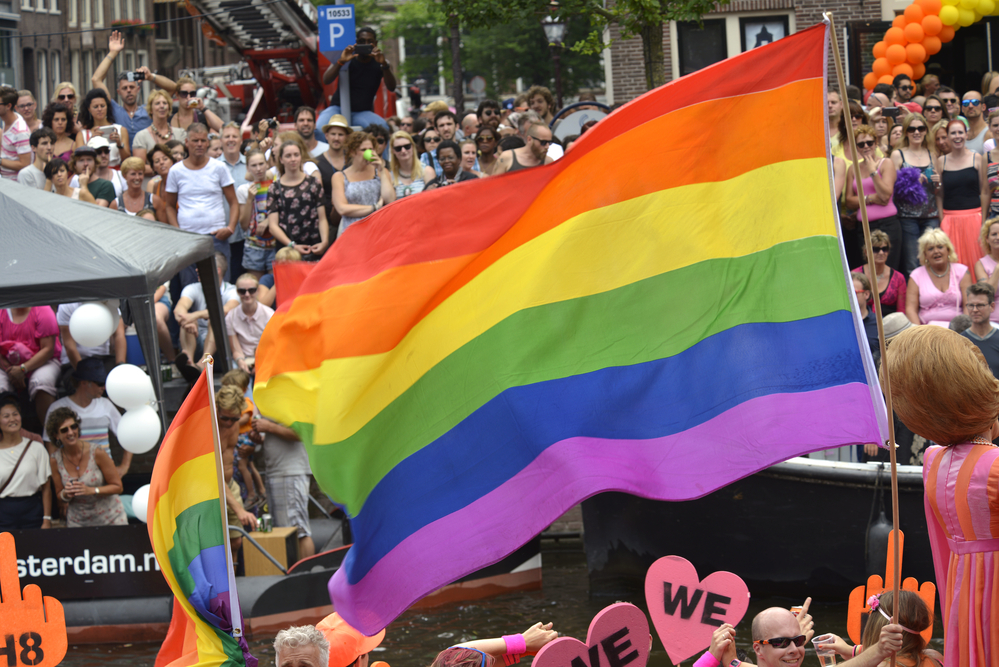Once one of the strongest advocates for equality, the Netherlands is now falling off the path towards creating an inclusive society and being a world leader in LGBTQ+ rights.
Even though the big crowds and celebratory atmosphere of Amsterdam Pride this weekend might’ve felt like the Netherlands is the place to be for LGBTQ+ rights, this picture just isn’t as colourful as it seems.
According to Robbert Dijkgraaf, the Dutch Minister of Education, Culture, and Science, the Netherlands struggles to stay on the path of leadership for LGBTQ rights.
In fact, opposition to LGBTQ+ rights in the Netherlands is becoming more vocal and aggressive, according to Bloomberg.
Opposition bubbles under the surface
Although the Netherlands was the first country in the world to legalise same-sex marriage, things are an entirely different story today.
In an interview, Dijkgraaf points to stronger resistance from certain societal groups, such as extreme right-wing political parties. Even among the general populace, there are more and more Dutch people that take the country’s inclusiveness for granted.
These comments by the Dutch minister come at a time when the Netherlands fell to 14th place on Rainbow Europe’s list of the best European countries for LGBTQ rights.
Our #RainbowEurope Map 2023 is live, benchmarking 49 European countries on their legal and policy situation for LGBTI people. Check out https://t.co/aTIBONQOI3 now! pic.twitter.com/gfI8KHqEso— ILGA-Europe (@ILGAEurope) May 11, 2023
The advocacy group signalled that hate crimes against the LGBTQ community were becoming more and more common in the Netherlands.
Rainbow Europe also pointed out that the Dutch government wasn’t doing enough to protect the community. In particular, there was found to be inadequate state assistance for trans individuals facing domestic violence.
More hate against the LGBTQ+ community
Sadly, many incidents this year exemplify these trends. Just last month, a monument in The Hague for the LGBTQ+ community was vandalised.
READ MORE | The most open-minded country on earth? Nee, 50% of Dutchies think Pride is too ‘extreme’
Earlier this year, Dutch football fans were repeatedly heard chanting homophobic slurs. And, after Rikkie Valerie Kolle won the coveted Miss Netherlands beauty pageant, she faced an outpouring of online hate.
Even at the political level, openly gay Climate Minister Rob Jetten faced a wave of homophobia when he announced his candidacy for party leadership.
Want the latest Dutch news to come zooming through the internet to your inbox? Dat kan! Subscribe to DutchReview’s weekly roundup 📬




Hi there,
It’s very interesting that Dijkgraaf refers to ‘certain societal groups’, and gives right extremist as an example. This is weird, because the city of Amsterdam actually researched who’s responsive for street intimidation towards women and lgbtq+ people. The results, and this research in general, are very hard to find (it took my almost an hour). I suspect the reason behind this is that politicians, and even ‘independent’ journalists, are scared of being called racists. Here’s a link to an article from AT5 about this research (https://www.at5.nl/artikelen/210129/slachtoffers-homohaat-belagers-zijn-vaak-jongeren-met-niet-nederlandse-achtergrond), and here’s a link to the actual research (https://upload.gscdn.nl/uploads/f6ce9eeea9_Bijlage_3_Actieonderzoek_Anti-discriminatie_LHBTIQ_2020-2021_final_3_0.pdf). It’s funny, and sad, because the left-wing party Groenlinks, initiated this research, but obviously due to the outcome, no further actions were taken and, personally, I feel like they just disregarded it.
What’s even more funny, and sad, is that Dijkgraaf is trying to blame right extremists. Sure, it’s easier and better for PR to blame those groups, but when looking at the research, that’s not really the case.
I’m sure you weren’t even aware of these insights, and I hate the fact that people will call me racist for pointing this out, but to be honest I’m just pointing out facts.
I think politicians are deliberately choosing not to refer to this research, to keep up their public image. But not acknowledging the facts is kind off contributing to the problem. It’s not about who’s at fault, but about how we can prevent them from doing it in the future. We are trying to resolve a problem, but this will never happen when we don’t dare to state who’s causing these problems.
I’d love a response and hear what you think about this and if it’s surprising, as I took quite a bit of effort to find the research and get the facts straight!
Kind regards,
Reinoud van Delft